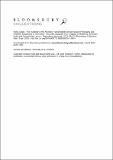Files in this item
The 'authority of the ancients'? Seventeenth-century natural philosophy and aesthetic responses to mountains
Item metadata
| dc.contributor.author | Hollis, Dawn | |
| dc.contributor.editor | Konig, Jason | |
| dc.contributor.editor | Hollis, Dawn | |
| dc.date.accessioned | 2023-04-04T10:30:02Z | |
| dc.date.available | 2023-04-04T10:30:02Z | |
| dc.date.issued | 2021-05-06 | |
| dc.identifier | 283658212 | |
| dc.identifier | e1eec6d5-c208-4314-9797-16e1f3861915 | |
| dc.identifier | 85191827118 | |
| dc.identifier.citation | Hollis , D 2021 , The 'authority of the ancients'? Seventeenth-century natural philosophy and aesthetic responses to mountains . in J Konig & D Hollis (eds) , Mountain dialogues from antiquity to modernity . Ancient environments , Bloomsbury Academic , London , pp. 55-72 . https://doi.org/10.5040/9781350162853.ch-003 | en |
| dc.identifier.isbn | 9781350162822 | |
| dc.identifier.isbn | 9781350194106 | |
| dc.identifier.isbn | 9781350162839 | |
| dc.identifier.isbn | 9781350162853 | |
| dc.identifier.other | ORCID: /0000-0003-3549-1447/work/130659968 | |
| dc.identifier.uri | https://hdl.handle.net/10023/27329 | |
| dc.description | Funding: The authors thank the Leverhulme Trust for their generous support of the wider project, ‘Mountains in ancient literature and culture and their postclassical reception’, of which it is a part. | en |
| dc.description.abstract | In 1684, the natural philosopher Thomas Burnet threw an intellectual grenade with his Sacred Theory of the Earth. Although he characterized mountains as ugly, disordered ruins, Burnet also acknowledged the enormous pleasure of viewing these ‘greatest objects of Nature’. As such, he has frequently been posited as a transitional figure in the development of a modern mountain aesthetic; by contrast, this chapter will argue that Burnet’s positive response was entirely in keeping with the attitudes of his era. It will further locate the contested knowledge-making of ‘the Burnet debate’ as occurring at the intersection of classical ideas, Scriptural interpretation, and empirical rationality. Despite a rhetoric which rejected the ‘authority of the ancients’, Burnet and his disputants turned to classical literature in order to unpick such questions as the form of the Chaos out of which the world developed, the mountainous nature of Paradise, and the aesthetic value of rugged landscape. | |
| dc.format.extent | 18 | |
| dc.format.extent | 564605 | |
| dc.language.iso | eng | |
| dc.publisher | Bloomsbury Academic | |
| dc.relation.ispartof | Mountain dialogues from antiquity to modernity | en |
| dc.relation.ispartofseries | Ancient environments | en |
| dc.subject | BH Aesthetics | en |
| dc.subject | MCC | en |
| dc.subject.lcc | BH | en |
| dc.title | The 'authority of the ancients'? Seventeenth-century natural philosophy and aesthetic responses to mountains | en |
| dc.type | Book item | en |
| dc.contributor.sponsor | The Leverhulme Trust | en |
| dc.contributor.institution | University of St Andrews. School of Classics | en |
| dc.identifier.doi | 10.5040/9781350162853.ch-003 | |
| dc.identifier.url | https://doi.org/10.5040/9781350162853 | en |
| dc.identifier.url | https://discover.libraryhub.jisc.ac.uk/search?isn=9781350162822&rn=1 | en |
| dc.identifier.grantnumber | RPG-2016-395 | en |
This item appears in the following Collection(s)
Items in the St Andrews Research Repository are protected by copyright, with all rights reserved, unless otherwise indicated.

